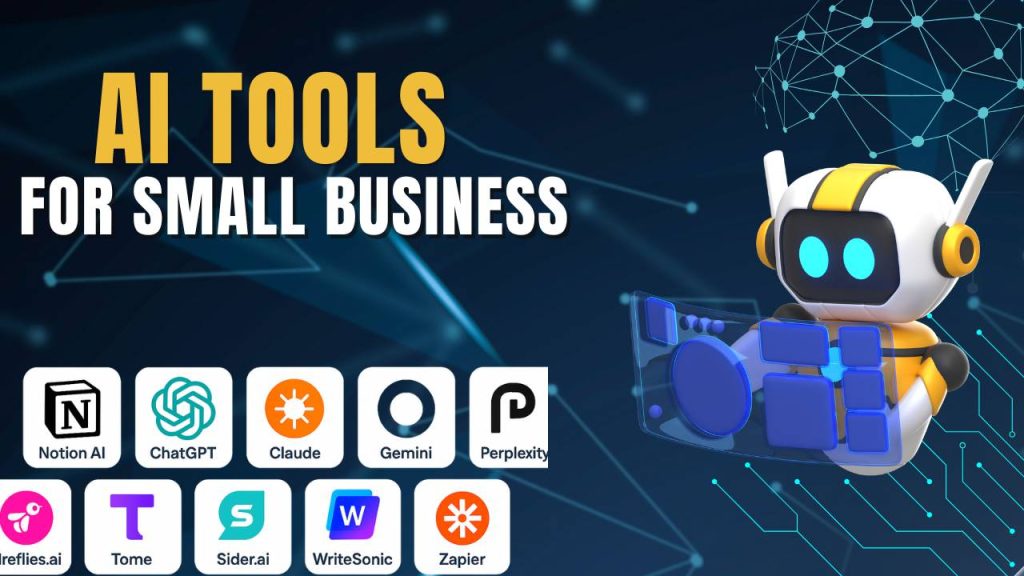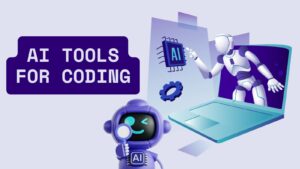In 2026, artificial intelligence (AI) has transitioned from a luxury add-on to a critical engine of growth for small businesses. With limited resources, tight competition, and growing customer expectations, small enterprises are increasingly turning to AI tools for small business to streamline operations, boost productivity, and enhance customer experiences.
From automating repetitive tasks to providing real-time insights and creative support, AI tools now offer small businesses the same strategic advantages once reserved for large enterprises. Below is a curated list of the 10 best AI tools for small businesses in 2026, tailored for different functions—content creation, customer service, branding, and more.
Why AI Tools Are Essential for Small Businesses in 2026
AI tools in 2026 offer small businesses powerful, affordable, and easy-to-use solutions for everyday challenges. From saving time to enhancing customer experiences, here’s why they matter:
- Task Automation: AI handles repetitive tasks like emails, invoicing, and customer support—saving time and reducing manual errors.
- Personalized Marketing: Tools analyze customer data to deliver tailored campaigns, improving engagement and boosting sales with minimal effort.
- 24/7 Support: AI chatbots provide instant, round-the-clock customer service, improving satisfaction without the need for full-time staff.
- Smart Analytics: AI delivers real-time insights on sales, behavior, and trends, helping businesses make faster, data-driven decisions.
- Creative Assistance: AI tools help create blogs, social posts, videos, and graphics—making professional content creation easier and faster.
With seamless integration into platforms like Shopify, WordPress, and Slack, AI tools for small business are no longer optional—they’re essential for growth in 2026.
Top 10 Best AI Tools for Small Businesses in 2026
Each AI tool listed below serves a specific function—content creation, marketing, finance, support, or customer management—and is tailored to the unique needs of small businesses striving to grow in 2026.
1. ChatGPT Business – AI-Powered Virtual Assistant for Productivity and Support
ChatGPT Business stands out as a versatile tool that functions like an extra employee. It helps small businesses handle a wide range of tasks such as drafting professional emails, answering complex customer questions, writing blogs, and even generating code or business strategies. With GPT-4.5 and later advancements, it delivers more accurate, relevant, and context-aware responses than ever before.
For instance, if you’re running a digital agency, ChatGPT can write SEO-optimized blogs based on your niche. If you’re in retail, it can help manage customer inquiries, automate returns, or assist with FAQ generation. It also integrates with tools like Notion, Google Workspace, and Slack, allowing seamless collaboration within teams.
Most importantly, ChatGPT is scalable—perfect for solopreneurs today and teams of 10+ tomorrow. It’s one of the most powerful AI tools for small business users who need a generalist tool that can perform multiple roles effectively.
2. Jasper AI – Ultimate AI Copywriter for Marketing and Branding
Jasper AI has become a go-to tool for marketers and entrepreneurs looking to create high-quality, engaging content without the need for a full-time copywriter. It specializes in marketing copy, sales pages, blog articles, email campaigns, and even social media content. With its brand voice training features, you can ensure consistent messaging across all platforms.
In 2026, Jasper comes with improved contextual learning capabilities, allowing it to remember past campaigns, writing tone, and even specific product features. This creates a seamless content creation experience that feels tailored, not robotic.
Launching a new product line, running a promotional event, or simply maintaining your blog, Jasper AI reduces your workload significantly. It also includes multilingual support, allowing you to target international audiences, which is increasingly valuable in a global market.
3. Pictory – Effortless Video Creation from Text Content
Video content is dominating consumer attention across platforms in 2026, and Pictory makes professional video creation accessible to small businesses without video-editing skills. With just a few inputs—like a blog post, script, or even a product description—Pictory uses AI to create stunning videos with transitions, subtitles, and voiceovers.
This is especially helpful for businesses involved in education, product marketing, or influencer collaborations. You can generate how-to videos, explainer animations, or promotional shorts for platforms like TikTok, Instagram, and YouTube.
New AI features in 2026 also enable automatic scene matching, text summarization for shorter clips, and brand overlay management. For small businesses trying to create a visual impact, Pictory is one of the most budget-friendly and effective AI tools for small business video strategy.
4. Looka – AI Branding Assistant for Logos and Visual Identity
Looka allows small businesses to create a strong visual identity without needing to hire a graphic designer. It begins by collecting your preferences in color, style, and industry. Then, using AI, it instantly generates dozens of logo concepts tailored to your brand.
Once a logo is selected, Looka’s AI builds a complete branding kit, including business cards, social media templates, email headers, and even website mockups. Everything is customizable and ready to download.
This is particularly useful for new businesses launching on a tight budget or rebranding with a fresh look. With Looka, even non-designers can launch a professional-looking brand within hours. It’s one of the most accessible AI tools for small business owners needing a fast, affordable branding solution.
5. QuickBooks Online + AI Add-ons – Streamlined AI-Powered Financial Management
Managing finances, especially during rapid growth phases, can be overwhelming. QuickBooks Online, already a favorite accounting software, now includes AI tools that simplify bookkeeping, payroll, and tax preparation.
AI features allow automatic transaction categorization, income-expense tracking, fraud detection, and cash flow forecasting. You also receive proactive alerts when expenses are unusually high or when invoices are overdue, helping you take action quickly.
For small businesses without an in-house accountant, QuickBooks’ AI features can save time, reduce human error, and provide insights that influence better financial decisions. It’s one of the most essential AI tools for small business finance management in 2026.
6. Surfer SEO – Real-Time SEO Optimization for Maximum Visibility
Search engine optimization (SEO) is the backbone of online visibility. Surfer SEO empowers small business owners to write content that ranks higher on Google by analyzing top-ranking pages and offering real-time suggestions.
Its AI-driven editor evaluates keyword density, word count, headings, and semantic relevance. It even suggests internal and external links, which are crucial for search rankings. Surfer now includes AI brief generation and integration with Google Docs and WordPress.
This tool is ideal for entrepreneurs, bloggers, and e-commerce owners who want their websites to attract organic traffic without spending on expensive SEO agencies. As one of the smartest AI tools for small business web strategy, it turns content into a long-term marketing asset.
7. Tidio – Smart Chatbot for Customer Interaction and Sales
Customer support can make or break a business. Tidio helps small businesses provide instant support through AI chatbots and live chat integration. Whether it’s answering questions about shipping, product details, or returns, Tidio ensures customers get instant, accurate responses.
Its chatbot builder is user-friendly and comes with ready-made templates for industries like e-commerce, hospitality, healthcare, and more. In 2026, new features include behavioral tracking, proactive messaging, and AI-generated product recommendations.
What’s more, it integrates with Messenger, Instagram, and WhatsApp, offering an omnichannel support system. This makes Tidio one of the most powerful AI tools for small business owners focused on enhancing customer experience and boosting conversions.
8. Copy.ai – Lightning-Fast Copy Generation for Every Use Case
Copy.ai is a writing assistant that allows businesses to generate engaging, relevant, and SEO-friendly content across different formats. Whether it’s email marketing, product descriptions, landing pages, or LinkedIn posts, Copy.ai saves hours of manual writing.
It comes with frameworks like AIDA and PAS to structure persuasive copy, and with 2026 upgrades, it can adapt tone, optimize for mobile viewers, and even auto-translate for global campaigns.
For businesses running multi-channel campaigns, Copy.ai ensures consistency and quality in messaging. It’s one of the most versatile AI tools for small business teams that want professional content at speed.
9. Zoho CRM with Zia – Intelligent Sales and Customer Relationship Management
Managing leads and relationships is critical, especially when trying to scale. Zoho CRM, powered by its AI assistant Zia, helps small businesses streamline sales, track customer interactions, and automate follow-ups.
Zia offers real-time insights on which leads are most likely to convert, predicts customer churn, and even monitors team performance. It can also analyze email interactions and schedule reminders to engage with prospects at the right time.
In 2026, Zia also includes voice commands and predictive task automation, which means your CRM doesn’t just store data—it actively works for you. For growing teams, Zoho CRM with Zia is one of the most impactful AI tools for small business sales and customer strategy.
10. Canva Magic Studio – Create Stunning Visuals with AI Power
Canva has long been a favorite for DIY design, and with the launch of Magic Studio, it’s now powered by AI. Magic Write helps create headlines and content for your design. Magic Design uses prompts to build templates and layouts, while text-to-image tools allow users to generate custom visuals.
Canva now suggests layout improvements, color matching, and design trends based on your industry. You can instantly create Instagram ads, flyers, presentations, and banners—all with AI-generated content.
For small businesses looking to produce professional-level designs without hiring a graphic designer, Canva Magic Studio is among the top AI tools for small business visual marketing in 2026.
How to Select the Right AI Tools for Your Small Business
Choosing the right AI tools for your small business can make a significant difference in how efficiently you operate, how quickly you scale, and how effectively you compete in the marketplace.
With so many options available in 2026, it’s important to carefully evaluate each tool based on your business needs and future goals. Below are key factors to consider—each explained in more depth to help you make the best decision.
1. Identify Your Bottlenecks
Every small business faces unique operational challenges. Are you spending too much time writing content, responding to customer inquiries, managing finances, or generating leads? Start by assessing where most of your time and resources are going and which areas are slowing down your workflow.
If content creation is draining your team, consider AI writing assistants like Jasper or Copy.ai. If customer service is overwhelming, a tool like Tidio or ChatGPT can handle queries around the clock. Pinpointing these pain points will help you find AI tools that solve the exact problems holding your business back.
2. Consider User-Friendliness
AI should simplify your workflow—not complicate it. Choose tools with intuitive dashboards, simple learning curves, and helpful onboarding tutorials or customer support. The best AI tools for small business are built for users with little to no technical expertise.
Avoid tools that require extensive setup or technical knowledge unless you have a tech-savvy team. Platforms like Canva, Looka, and QuickBooks offer user-friendly interfaces that can be mastered quickly, helping you save time and reduce training costs.
3. Look for Scalability
Think beyond your current needs and consider how the tool will support you as your business grows. Does it offer features for larger teams? Can it handle increasing data volumes or customer interactions?
Many AI tools offer scalable plans that start small but expand as your needs grow. For example, Zoho CRM and Jasper AI offer advanced features like team collaboration, analytics dashboards, and automation as your business scales.
Investing in scalable solutions prevents future disruptions and reduces the need to switch platforms down the road.
4. Evaluate Integration Capabilities
AI tools work best when they integrate seamlessly with your existing software. Whether you use Shopify for e-commerce, QuickBooks for accounting, or Mailchimp for email marketing, ensure the AI tool can sync and communicate with these platforms.
Tools with strong integration capabilities allow you to automate workflows across your systems. For instance, integrating Surfer SEO with Google Docs or WordPress helps streamline your publishing process. Choosing integrated tools creates a more efficient digital ecosystem for your business.
5. Start Small, Then Scale Up
Rather than committing to expensive enterprise plans, begin with free trials or basic tiers. Test how the tool performs in real business scenarios and assess its ROI over time. Most leading AI tools for small business offer affordable starter plans designed for entrepreneurs or micro-teams.
Use this period to evaluate whether the tool actually saves you time, improves performance, or enhances customer experience. Once you see results, you can upgrade to more advanced features with confidence, ensuring your investment aligns with business outcomes.
FAQs
1. What are AI tools for small business, and how do they work?
AI tools for small business are software platforms powered by artificial intelligence that help automate tasks, analyze data, generate content, provide customer support, and more. These tools use machine learning and natural language processing to understand inputs, learn from patterns, and offer intelligent outputs that save time and enhance productivity. Most AI tools are cloud-based and easy to integrate with existing business software.
2. Are AI tools too expensive for small businesses to afford?
Not at all. Most AI tools now offer flexible pricing with free trials, freemium models, and affordable starter plans designed specifically for small businesses. Tools like Canva, ChatGPT, and Tidio provide free or low-cost options, making them highly accessible even for solo entrepreneurs or startups with limited budgets.
3. Do I need technical skills to use AI tools in my business?
No, most modern AI tools are built with non-technical users in mind. They offer intuitive dashboards, drag-and-drop features, and guided templates. Platforms like Jasper, Looka, and QuickBooks with AI add-ons require no coding skills, allowing anyone to operate them with minimal training.
4. How can AI tools help my business grow faster?
AI tools increase efficiency by automating repetitive tasks, reducing errors, and providing insights that help you make smarter decisions. Whether it’s automating customer service with chatbots, generating marketing content in minutes, or forecasting cash flow trends, these tools allow you to focus on strategic growth rather than time-consuming operations.
5. Which departments in a small business benefit most from AI tools?
AI can support nearly every function in a small business, including:
- Marketing – Content generation, SEO optimization, email automation
- Sales – Lead scoring, CRM, follow-up automation
- Customer Service – Chatbots, ticketing, live chat
- Finance – Expense tracking, forecasting, invoicing
- Design – Branding, logos, social media graphics
Depending on your business type, you can adopt AI tools that cater to the most time-intensive areas.
6. Can AI tools replace employees in small businesses?
AI tools are not meant to replace employees but to augment human productivity. They handle repetitive or time-consuming tasks, allowing your team to focus on creative, strategic, and customer-focused work. Instead of reducing jobs, AI tools help small teams do more with less and increase job satisfaction by reducing burnout.
7. How do I choose the right AI tool for my business?
Start by identifying your current challenges (e.g., marketing, customer service, finance). Then look for AI tools that are:
- User-friendly
- Scalable as your business grows
- Compatible with your existing systems
- Cost-effective and provide ROI
Always test tools through free trials before committing to long-term plans. Refer to the “How to Select the Right AI Tools” section for a detailed guide.
8. Are AI tools secure and trustworthy for handling customer data?
Yes, most reputable AI platforms adhere to strict data security and privacy standards such as GDPR and SOC 2 compliance. It’s essential to review each tool’s data handling policy, ensure secure integrations, and use tools from trusted providers. You should also consider tools that offer encryption and role-based access controls.
9. Can AI tools help improve customer engagement?
Absolutely. Tools like Tidio and ChatGPT enable real-time customer interactions through chatbots and automated responses. AI also personalizes marketing campaigns based on user behavior, improving engagement and retention. From onboarding to support and upselling, AI helps build stronger customer relationships at scale.
10. What are some examples of the best AI tools for small business in 2026?
Some of the top-rated AI tools for small business in 2026 include:
- ChatGPT Business – Content, support, and productivity assistant
- Jasper AI – Marketing and copywriting automation
- Pictory – Video creation from text
- Looka – AI branding and logo design
- QuickBooks with AI – Automated financial management
- Tidio – AI chatbot for customer support
- Surfer SEO – Content and SEO optimization
- Zoho CRM with Zia – AI-enhanced customer management
These tools are widely used for their ease of use, affordability, and high-impact functionality.






